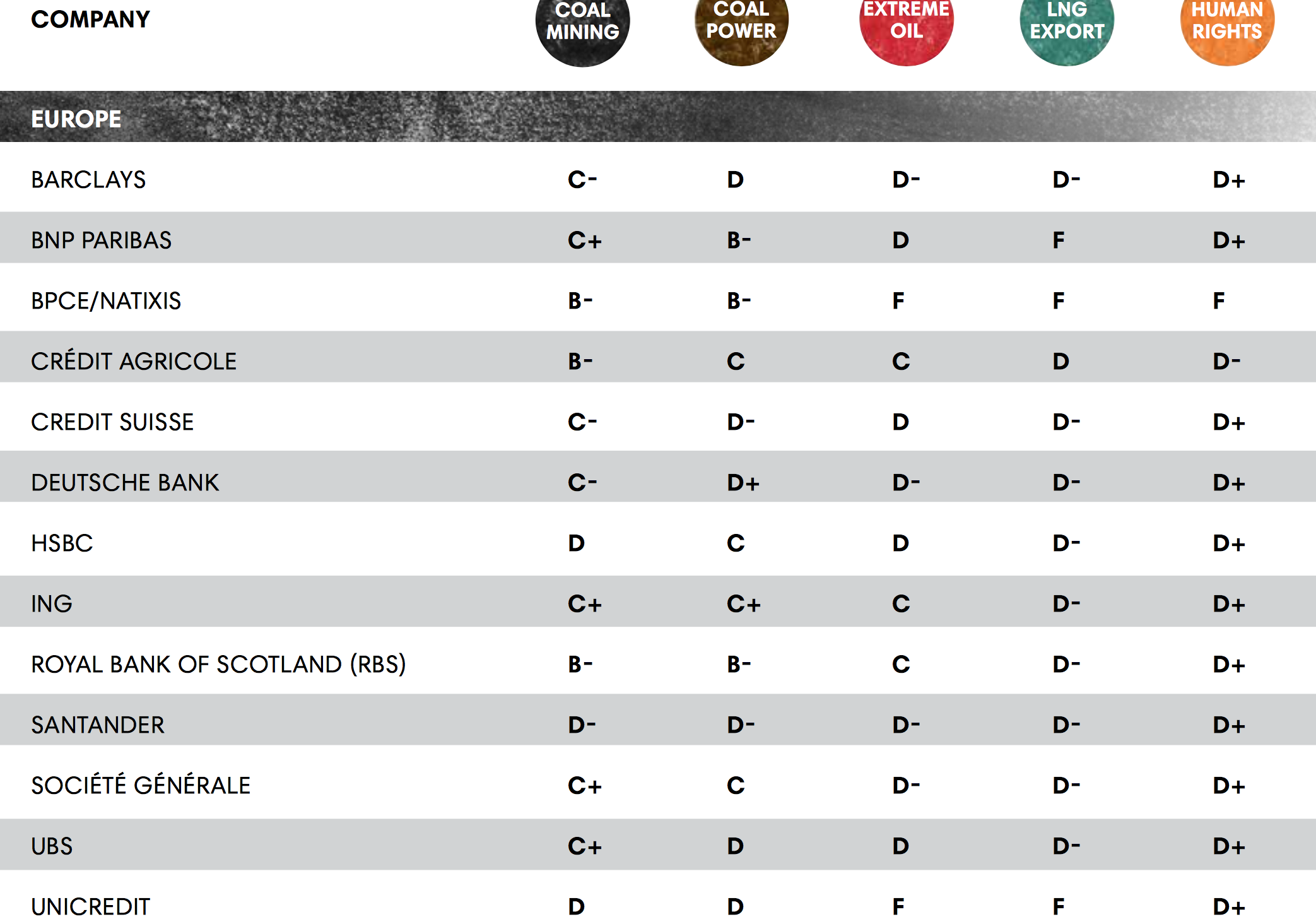The world’s biggest banks are driving climate change by pumping hundreds of billions of dollars into “extreme” fossil fuels, according to a report published yesterday.
The report by Rainforest Action Network (RAN), BankTrack, Sierra Club and Oil Change International provides the first look at bank financing for fossil fuels since the Paris Climate Agreement.
After the Paris agreement, financing extreme fossil fuels amounts to shorting the climate.
It evaluates the policies and exposure of 25 US, European and Canadian banks that have investments in the most carbon intensive, financially risky and environmentally destructive industries, including coal mining, coal power, tar sands, Arctic oil, deep drilling and North American liquefied natural gas.
The report named Citigroup and Bank of America as the banks most heavily invested in coal, while JPMorgan Chase, Barclays, and Bank of America are the biggest banks financing “extreme” oil and gas.
Royal Bank of Canada is the biggest backer of tar sands. Meanwhile JPMorgan Chase, Bank of America, Citigroup, Deutsche Bank, Morgan Stanley, and BNP Paribas appear in the top 10 of each extreme fossil fuel subsector.
The report card, downloadable on page 6 of the report here, and also below, also graded banks on their human rights policies, and found that they performed poorly by this measure too.

Levels of exposure to carbon intensive industry were high across the board, demonstrating that banks are locking the world onto a path of major climate instability. Grades on policies were also poor, with an overall D average for the Report Card, showing that a vast majority of banks have no significant policies in place to stop funding extreme fossil fuels.
At a time when the world’s nations have agreed to limit global warming to 1.5 degrees Celsius to avoid the most catastrophic effects of climate change, leading financial institutions have continued business as usual investment in fossil fuels in direct contradiction of global consensus.
Jason Opeña Disterhoft, Senior Campaigner with Rainforest Action Network, said: “In finance terms, ‘short-selling’ or ‘shorting’ is when an investor profits if a company or asset declines in value. It means betting on failure. After the Paris agreement, financing extreme fossil fuels amounts to shorting the climate. These bets are also at the expense of some of the most vulnerable communities living in fossil fuel ‘sacrifice zones’ around the world. We need banks to move now to help pivot the economy away from extreme fossil fuels for the sake of the planet and its people.”
Yann Louvel, BankTrack’s Climate and Energy Campaign Coordinator, said, “Many banks announced a move away from coal in the run up to COP21 and after, but most of these focused only on coal mining. Our assessment clearly shows that they still have a long way to go to concretely exit this industry, and even more for the other extreme fossil fuel sectors. None of these banks can claim to support the Paris Agreement, to be aligned with a 2° scenario or to be fighting climate change – as we too often read in their sustainability reports – if they continue to finance these destructive sectors.”
At a time when the world’s nations have agreed to limit global warming to 1.5 degrees Celsius to avoid the most catastrophic effects of climate change, leading financial institutions have continued business as usual investment in fossil fuels in direct contradiction of global consensus, the campaign network said.
The report found that in the past three years, the banks have sunk $42 billion into companies active in coal mining; $154 billion in the 20 largest coal-fired power producers; $306 billion for companies that drill extreme oil; and $282 billion for companies building liquefied natural gas export infrastructure.
If governments follow through on the Paris agreement and limit carbon emissions, these investments could result in stranded assets and significant losses, the report added.
The score card reflects bank movement on coal mining, where ten of the biggest U.S. and European banks committed to reduce funding for the coal mining sector in the last year. Campaigners said: “Based on their ability to quickly switch their stance on coal over the last year alone, banks are capable of making the critical choice to cut out extreme fossil fuel investments.”
Want to know how your bank scores? Read the report:




